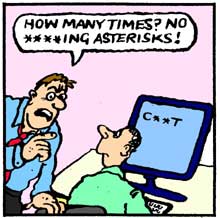The Eggcorn Database has its own forum now. I also made some changes to the posting rules. Oh, and we’ve managed to pass the threshold of 500 eggcorns this month.
Sometimes apparently simple entries can turn out to be more complex than meets the eye. Yesterday, Kaz Vorpal entered the substitution of flounder v. for founder v. This one had been suggested several times and is cited in many collections of usage advice, but I always resisted entering it. I saw it as an example of a confusion about which is which among two “complicated” words. (My rule of thumb for eggcorns: a “difficult” word is replaced with an “easy” one.) So I edited Kaz’ entry accordingly. But Arnold Zwicky didn’t agree, and he had the data to show that some people think of flounder, the fish:
In fact, some people have explained to me that “flounder” is the word to use, because a ship in this sort of distress flops about like a fish — a flounder, in particular — out of water. The association with flounder (the fish) seems to be unetymological: OED2 labels it “of obscure etymology”, suggests various non-fishy sources, and gives as its earliest sense the not particularly fish-related ’stumble’ (attested from 1592). But then the sense extended to ’struggle violently and clumsily, struggle in mire’ and the way was open for comparison to a flopping flounder. (Suspiciously, several of the OED2’s citations actually mention fish.)
Now wouldn’t that make for a great borrowing into German, where the fish is called Flunder?#[1] Herumflundern (gloss: flounder about/around) has a great sound to it.#[2] And indeed, at least one person has had the idea already:
- Das Problem scheint in der Tatsache zu liegen, dass wir irgendwo mittendrin stecken, und herumflundern wie ein Fisch ausserhalb des Wassers. (link)
[The problem seems to lie in the fact that we are stuck somewhere in the middle of this, and are floundering about like a fish out of water.]
And there seems to be a dialectal German verb, flundern, which I’m not familiar with.
[1]: Much, much better than what the Deutsche Bahn, the German railway company, does with their “InfoPoints” , “Economy Vierer” compartments, “Bahn & Bike” trains and the “BahnCard Teen” (a travel pass for 12 to 17 year olds). [2]: And it’s an occupation I’ve been getting much practice in lately. I’m starting to suspect short-term memory problems, but that’s another topic.
Related posts: Amuse-bouche to zaibatsu, For the danglers..., Euphemism of the day: concertina wire, Non-eggcorn: "equilateral(ly)", Cricket, Today's interminable NPs , Avoiding the asterisks ... of avoidance
Technorati (tags): anglais, anglicisms, Deutsch, eggcorns, English, German, language, langue


